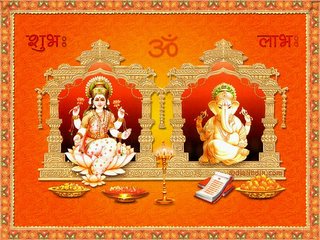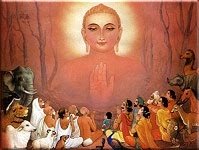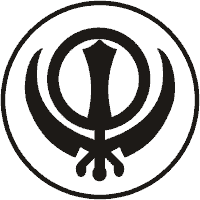 This Saturday, 21 October, marks the feast of Diwali. The word Diwali is derived from the Sanskrit Deepavali and refers to the earthen lamps that people place around their homes as part of the observance of this feast. For the Hindu faithful, the light from the lamps "represent," according to Candace Murphy, whose article on the feast appears on the website of the Hindu American Foundation, "the dispelling of ignorance, and the illumination of truth."
This Saturday, 21 October, marks the feast of Diwali. The word Diwali is derived from the Sanskrit Deepavali and refers to the earthen lamps that people place around their homes as part of the observance of this feast. For the Hindu faithful, the light from the lamps "represent," according to Candace Murphy, whose article on the feast appears on the website of the Hindu American Foundation, "the dispelling of ignorance, and the illumination of truth."Diwali falls on the 15th day of the dark fortnight of the Hindu month of Kartik, or the last day of the last month in the lunar calendar. Hence, as with all lunar holidays, like Easter, it does not fall on the same day of the solar calendar from year-to-year. In addition to being a celebration among Hindus, Diwali is also observed by Sikhs and Jains. The significance of the feast for Sikhs is a celebration of "the release of the Sixth Guru, Hargobind, from captivity by the Mughal Emperor Jehangir." Jains, meanwhile, commemorate Diwali as the day Lord Mahavira, the last of the Tirthankaras, attained Nirvana after his death in 527 BC.

All this is a lead-in to the statement issued today at the Vatican, by Paul Cardinal Poupard, president of the Pontifical Council for Inter-religious Dialogue, to Hindus (Why not Sikhs and Jains? I do not know). The title of the message is Overcoming Hatred with Love. The core of Cardinal Poupard's message is found in this paragraph:

"God loves us all without exception and his love is unconditional. Our human response to God’s love must be spelt out in concrete stewardship of God’s creatures, especially to human beings. It is urgent and necessary that believers of different religions manifest jointly to the world that hatred can be overcome by love. In today’s complex societies, is it not possible for us to join hands and collaborate in seeking justice for all, working together on common projects, for the development of the downtrodden, the marginalized, the destitute, the orphan and the weak? 'Despite the great advances made in science and technology, each day we see how much suffering there is in the world on account of different kinds of poverty, both material and spiritual' (Deus caritas est, n. 30). Moral and spiritual poverty, which are caused by breeding hatred in one’s heart, can be eradicated by believers who are filled with love and compassion. Love creates trust, which in turn, promotes genuine relationships among believers of different religions."
In his message from a previous year, Archbishop Michael Fitzgerald, Cardinal Poupard's predecessor, now Papal nuncio to Egypt, wrote in one his Diwali messages:
"You will agree with me in recognizing that one of the purposes of religious feasts is to make us better human persons. During the season of Diwali, as you strive to overcome darkness through light, evil through goodness and hatred through love, I would like to propose to you, as one of your Christian friends, that we focus our attention on the evils in our society that afflict children: forced labor, forced conscription, break down of the family, trafficking in organs and persons, sexual abuse, forced prostitution, AIDS, the sale and use of drugs, etc."


No comments:
Post a Comment